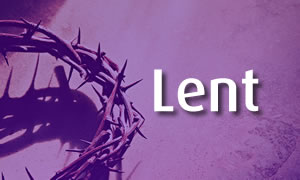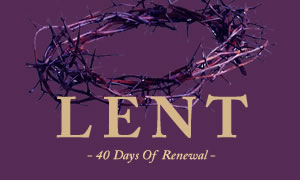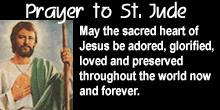


 Lent is a period of fasting leading up to Easter. The season is rooted in the 40-day fast of Jesus in the wilderness. Catholic Lent begins on Ash Wednesday, and ends right before the evening Masses of Holy Thursday, although Lenten penance continues through Holy Saturday.
Lent is a period of fasting leading up to Easter. The season is rooted in the 40-day fast of Jesus in the wilderness. Catholic Lent begins on Ash Wednesday, and ends right before the evening Masses of Holy Thursday, although Lenten penance continues through Holy Saturday.
In 2017, Lent begins on March 1st in the Latin Church (dates in other years).
Basic Facts About Lent
Liturgical Color(s): Violet (Purple)
Time of Year: Immediately following Ordinary Time after Epiphany; calendar date varies
Duration: Liturgically Lent lasts 44 Days, begins on Ash Wednesday and ends before the Paschal Triduum (and includes Sundays). The traditional Lenten fast is observed for 40 days, starting on Ash Wednesday, going through Holy Week, excluding Sundays.
Celebrates/Symbolizes: Jesus' wilderness fast; Preparation for Easter
Scriptural References: Matthew 4:1-11; Luke 4:1-13
Introduction
Many Christians throughout the world observe Lent. Catholic, Orthodox, and many Protestants benefit from this annual season of sacrifice and simplicity. For non-Christians, the observance of Lent may seem odd, since Christians voluntarily make sacrifices. Christians are simply imitating the practices and teachings of Jesus.
In reality, Lent ends up being different things, depending on the person. For some, it is a period of going on a diet; for others, it is when Catholic co-workers show up to work with ashes on their heads, and fast-food restaurants start selling fish sandwiches. So what exactly is Lent and where did it come from?
In basic terms, Lent is the season before Easter, in the Western Church, lasting liturgically from Ash Wednesday until the Mass of Holy Thursday exclusive (see General Norms for the Liturgical Year and Calendar). The evening of Holy Thursday begins the The Easter Triduum, which lasts from Holy Thursday to the Evening Prayer of Easter Day. However, Lenten fasting and penance continue until the end of Holy Week, and all of Holy Week is included in the traditional 40 day Lenten fast, despite Lent ending liturgically on Holy Thursday.
We should note that in many Protestant churches, the liturgical season of Lent continues through Holy Saturday, although in current Catholic discipline, Lent ends liturgically before Holy Thursday. While Sundays are typically excluded from fasting and abstinence restrictions, and are not numbered in the traditional "40 Days" of Lent, they are still part of the Lenten season, as can be seen from their Lenten themes. Thus, the way Lent is observed in the Catholic Church can seem a bit tricky, because the actual modern liturgical season (lasting 44 days, including Sundays) is numbered slightly differently than the traditional 40 day Lenten fast, which excludes Sundays.
The purpose of Lent is to be a season of fasting, self-denial, spiritual growth, conversion, and simplicity. Lent, which comes from the Teutonic (Germanic) word for springtime, can be viewed as a spiritual spring cleaning: a time for taking spiritual inventory and then cleaning out those things which hinder our relationship with Jesus Christ and our service to him.
Thus it is fitting that the season of Lent begin with a symbol of repentance: placing ashes mixed with oil on one's head or forehead. However, we must remember that our Lenten disciplines are supposed to ultimately transform our entire person: body, soul, and spirit, and help us become more like Christ. Eastern Christians call this process theosis, which St. Athanasius describes as "becoming by grace what God is by nature."
There are a few basic tasks that traditionally have been associated with Lent. Many of these have a long history. These are fasting, almsgiving, and prayer. In addition, reading the Scriptures and the Church's Writings can help one grow during the season. Let's look at each of these suggestions individually.
History
Lent probably originated with the pre-Easter baptismal rituals of catechumens, although the number of days set aside for fasting varied according to region. Irenaeus (AD 180) testifies to the variety of durations of pre-Easter fasts in the second century. Tertullian (AD 200) suggests that Catholics fasted two days prior to Easter, but that the Montanists (a heretical sect that Tertullian later joined) fasted longer. However, the number forty, hallowed by the fasts of Moses, Elijah, and especially Jesus, probably influenced the later fixed time of 40 days.
The Canons of Nicaea (AD 325) were the first to mention 40 days of fasting. Initially the forty day Lenten fast began on a Monday, and was intended only for those who were preparing to enter the Church at Easter. Lent still begins on a Monday in many Eastern Churches. Eventually the West began Lent on Ash Wednesday, and soon the whole Church, and not just catechumens, observed the Lenten fast. The East has no equivalent to Ash Wednesday.
The earliest fasts of Lent tended to be very strict, allowing one meal a day, and even then meats, eggs, and other indulgences were forbidden. The Eastern Churches follow this today. Now, in the Western Church, only Ash Wednesday and Good Friday are enjoined as strict fast days, but Fridays are set aside for abstinence from meat.
Sundays are not a part of the Lenten fast, because Sunday is always a feast of the resurrection. However, the Sundays of Lent are still a part of the Lenten liturgical season in the Western Church, and the worship services tend to be more simple and austere than normal. They lack the Gloria, and the joyous "alleluias" of the Easter season. The Western liturgical color of Lent is violet, symbolizing royalty and penitence. Solemnities like St. Joseph and the Annunciation, take precedence over Lenten observances in the Church calendar. These days, when they fall on Fridays, do away with Lenten abstinence requirements. However, at least in the current Western Church, Lent nearly always trumps the observances of minor feast days. Too many festivals take away from the simple and penitential spirit of the Lenten season. Certain devotions and liturgies have developed during the Lenten season, including (in the West), the Stations of the Cross.
Fasting:
The Western Rite of the Catholic Church expects its members age 18 to 59 to fast on Ash Wednesday and Good Friday, unless a physical condition prevents it. This means only one full meal is permitted in a fast day. The Fridays of Lent are days of required abstinence, meaning meat, and soups or gravies made of meat, are not permitted.
Abstinence is required of those age 14 and older. However, when we "give something up" for Lent, we are embracing a form of fasting, an excellent spiritual discipline. Eastern Christians have a more rigorous fast, abstaining from meat, wine, oil, dairy products, and even fish. Some people choose to give up sins (gossip, drunkenness, etc) for Lent.
In this way, Lent represents a spiritual training time to overcome evil. Pope St. Leo, for example, emphasized that fasting from wrath is required along with food. Some give up things they have a strong desire for, e.g. sweets, caffeine, etc. We have listed various things you can give up for Lent here. By giving these up, the person fasting learns to control a particular part of his or her life, which leads to greater self-discipline even when Lent is over.
As such in Lent we are able to learn, examine, and get under control our material excesses. Whatever you decide to fast from, remember, as Steven Clark likes to say: "Lent is more than a diet." Lent is about spiritual results, not material ones. So, while losing a few pounds may be a nice side benefit, all fasting should be done for God's glory and spiritual growth.
Prayer:
Lent is a perfect time to develop or strengthen a discipline of regular prayer. The Liturgy of the Hours, an ancient practice of praying throughout the day, is a good place to start. A good goal for Lent would be to read Morning Prayer and Evening Prayer every day. If you already do that, perhaps you could add noon or night prayer (also called Compline).
Contemplative prayer, based around the idea of silence or listening for God, is also well suited to Lent. There are also many excellent form prayers that reflect the penitential mood of Lent. We can also find many excellent prayers for Lent from the Scriptures. The Seven Penitential Psalms are excellent for prayer, as is the apocryphal Prayer of Manasseh.
Praying The Rosary throughout Lent can be rewarding too. Many excellent poems (including "Hymn to God the Father" by John Donne) and Lenten Canticles emphasize Lenten themes. Theology and liturgy should always be prayer, so a good discipline for Lent would be to make an effort to attend worship services whenever possible. Daily Mass would be very rewarding.
Almsgiving (Charity):
While Lent is about giving something up (i.e. fasting), it is also about putting something positive in its place. The best way to remove vice is to cultivate virtue. Lent has been a traditional time of helping the poor and doing acts of charity and mercy. While as Christians this is a year round calling, Lent is a good time to examine ways to get involved and to make resolutions to actually do them.
Giving alms can be done in more ways than just giving out money to people on the street. It can be done by helping your family, friends, and neighbours out of tight situations or being more generous to hired help. However, one of the best ways to give alms is by volunteering for a charity. There are many lay religious orders, which devote much of their time to charity.
Lent is a perfect time to discern a call to these or any other ministry. Some good charity organizations include Society of St. Vincent DePaul and Catholic Relief Services.
Scripture Reading:
When facing temptation in the desert, Jesus relied on Scripture to counter the wiles of the devil. It is a formidable weapon for us as well. Biblical illiteracy among Christians of all types is rampant and, quite honestly, shameful. Lent is an excellent time to remedy this problem. One way to read Scripture is to use the lectionary of the Liturgy of the Hours. This will get you through most of the Bible in two years.
The Bible is even online! Reading the Church Fathers can also be helpful to spiritual growth.


I have been thinking a great deal about my experience at Reconciliation this past Saturday. I felt an intense and unexplainable urge to go and confess my sins when I woke up that morning. I try to go every six weeks or so, but this was no routine visit to the priest for me. I needed to unburden myself of the numerous venial sins I had committed since I last participated in this Sacrament.
Purest Gold: God's Refining Fire in our Lives »
After salvation, many young Christians wonder if there's anything more to their newfound faith than just the security blanket of "being a Christian." Time and time again, God shows himself as a "refiner," and our lives are as gold. God started leading me in this study to understand what He was doing in my life, as well as in the lives of others.
Picking up my pen to write this column, I couldn’t imagine how time flies. Since the last publication of this column I have gone through a lot, especially the loss of my dear mother to whom I dedicate this article. Not only her, but seems I lost a whole generation of my close family.
How to Achieve Business Excellence »
“Do you see a man who excels in his work? He will stand before Kings; He will not stand before unknown men.” Proverbs 22:29
Spiritual Development for our Youth »
Most of us youth in today's fast moving world are easily thrown off by difficulties and worries.
The theme of conversion is a thread that runs all through Lent, but conversion takes on different aspects throughout the phases of Lent. The first two and a half weeks focused on the interior turning of hearts; the liturgy urges the faithful to reflect and examine consciences thoroughly.
Saint Josephine Bakhita »
Feast Day: February 8
Patron Saint Of: Sudan
Saint Josephine Margaret Bakhita was born around 1869 in the village of Olgossa in the Darfur region of Sudan. She was a member of the Daju people and her uncle was a tribal chief. Due to her family lineage, she grew up happy and relatively prosperous, saying that as a child, she did not know suffering.
Catholics Must Fast More Intensely This Lent»
The Norbertine Canons of St. Michael's Abbey have created this digital Lenten retreat so that you can journey through this holy season alongside them. If you want to have one of your best Lenten seasons yet, join us in our Lenten Program "The Great Fast" - https://theabbotscircle.com/the-great-fast-join
When Your Faith Is Put to the Test - Bishop Barron's Sunday Sermon»
Friends, we come now to the Second Sunday of Lent, and we’re on both dangerous and very holy ground with the first reading from the twenty-second chapter of Genesis. The ancient Israelites referred to it as the “Akedah,” which means the “binding”: Abraham binds and is ready to sacrifice Isaac at God’s command.

Copyright © 2002-2024 THE BEACON INTERNATIONAL CATHOLIC MAGAZINE. All rights reserved.
another mc.rufus interactive web design